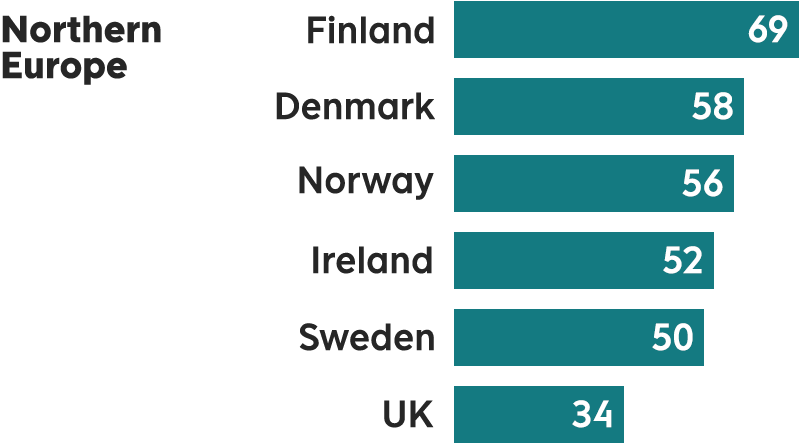The state of programmatic advertising in Finland - What you need to know
Programmatic buying has taken huge steps forward in Europe and Finland in the last few years. In 2021, programmatic buying took a 57% share of display advertising in Europe (Source: IAB Europe AdEx Benchmark 2021 Report). Finland is seeing a similar trend with advertisers turning to programmatic buying more and more in campaigns.
Programmatic buying options have increased in recent years. In addition to banner and video, for example out-of-home and digital audio are available. CTV (connected TV) is expected to see the biggest growth over the next year. Programmatic Guaranteed has also become a more popular buying method. (Source: IAB Europe Attitudes to Programmatic Advertising 2022 Report)
In Finland, deals are the real deal
In Finland, most programmatic buying takes place through private marketplace deals with publishers, rather than through an open marketplace. As much as 77% of buyers buy programmatic through deals. (Source: IAB Ohjelmallisen ostamisen nykytila ja trendit)
There is a lot to be said about making deals with publishers: it means more control over the list of media selected for campaigns, and that the media are of high quality.
Appearing in the right media environment, one that consumers trust is one of the fundamentals of advertising. This is particularly true in Finland. Finnish advertisers value brand safety, and it is very important to advertise in media and with content that Finnish consumers find trustworthy.
This goes both ways. Our research has shown that Finns place a lot of trust in quality
national media and buying intent increases when ads appear in national media.
Proportion that trusts most news most of the time

Source: Reuters Institute Digital News Report 2022
This is the reason why advertisers should invest in making deals in the Finnish market rather than buying programmatic solutions through an open marketplace. Deals guarantee more effective campaigns.
Start from the basics when buying programmatic
Now that we’ve established the importance of trust, it’s time to look at the basics of getting started with programmatic advertising in Finland.
Build trust through consistency
Before you start spending, you need to make sure that the campaign is in line with your overall marketing efforts. Programmatic buying campaigns should provide value for you as well as the customer. Misleading information and brand inconsistency are quick ways to lose potential customers.
Sounds simple, right? It is, when done right. Check that your key messages are in place, your website and other content is up-to-date and of high quality. Remember to have a well-designed customer funnel in place, so that you can reap the results of reaching your audience.
In other words, successful programmatic advertising will only get you so far if your marketing efforts fall short elsewhere.
Remember your target audience
You need to know your target audience to get the results – the more the better. Keep your target audience in mind before selecting the media, as you need to find media whose audience is more likely to resonate with your advertising.
The more you know about your audience, the more specific the details of your campaign targeting. For example, language, area and other key demographics often come to play when designing the targeting of your media spending. Finnish media do often keep close track of their readers and habits of consuming media.
If you want to get really specific, there are many ways to get creative with hyper local advertising. For example, in 2019 the Helsinki Regional Transport Authority carried out an advertising campaign for its kick scooter pilot in an area of Helsinki. The campaign’s social media report reveals that they used hyper local targeting to reach people on social media just when they were visiting that area of the city, gaining a high reach locally. Neat, right?
Use data, the good kind
One very important aspect of programmatic advertising is having relevant data about your target audience, as this can truly skyrocket your campaigns. For one, this will help you identify your audience at different touch points, removing the need to shoot in the dark. Secondly, it will help you tailor messages for efficient results, especially with the right tools.
For the purposes of programmatic advertising, the quality of data is key, but like elsewhere, it can vary greatly in Finland. There are different ways to go about this. You can use first-, second- and third-party data – and you can buy this data from an external party if needed.
First-party data is information you get directly from your customers or owned media, which makes it valuable and reliable. This can come, for example, through download forms or data from CRM tools. Second-party data is similar to first-party data, but from a partner or other platform. Third-party data comes from outside sources, such as media. They usually extract this data in large quantities of data, and hence it’s often more generic.
Tune in to changes in the marketing environment
Advertising is always tied to the current setting, which means that the rules and regulations governing it can change overnight. This sets pressure for marketers to be vigilant (read: compliant), but also to get creative.
Take, for example, browser cookie settings. Google has announced that it will remove third-party cookies in 2024. After this, the ways in which we target online advertising will change. It is also good to remember that the process has already started and the power of third-party cookies has already started to crumble. First-party data is becoming more and more relevant and smart publishers have already started to build their targeting ecosystems around them. Also, contextual targeting is on the rise and will become even more relevant in the future. This means that you should opt for campaign strategies that aren’t too built around certain channels or mediums, or at least allow for some leeway in a highly adaptable environment. This way the smallest changes won’t immediately make you re-examine your approach.
Consider externalising programmatic buying
When it comes to programmatic buying, consider using a third party, such as an agency, to free up time and ensure the right expertise. Plus, it’s always useful to get a bird’s eye view of your efforts.
With agencies or other third parties doing the bulk or all of programmatic buying for you, there are several advantages in terms of technological possibilities, volume-based pricing benefits and centralised know-how. You’ll also get help all the way from planning to execution, making sure you’ve covered all bases.
Start by examining whether you have the required skills in-house, or if you might need to consult an external provider of such services. Like other marketing efforts, programmatic advertising requires enough resources to keep the work going, follow up with the work and make tweaks when necessary.
Want to get started?
Now that you know the basics of getting started, perhaps it’s time to take the next step. With careful planning and some basic understanding of the market, you have a much better likelihood of succeeding in programmatic advertising.
Questions? We’d love to help.
Get in touch with us, and let’s talk.
Further Reading


Subscribe to our Newsletter
By submitting your email you agree that we may send you promotional emails and information about our services. You can unsubscribe any time. Check out our Privacy Policy.


